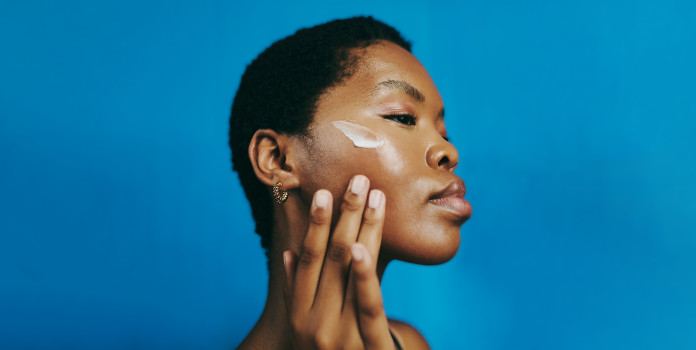If you have dry, coarse, and/or curly hair, you definitely know about shea butter. It’s the MVP of all moisturizers, especially because it both hydrates your hair (and skin) as well as seals it all in to prevent water loss. You’ll find it in just about every rich deep conditioner on the market for this reason. It’s a masterpiece, some might even say. But is shea butter for skin equally as effective?
The answer is complicated, unfortunately, and really all depends on your skin type. For some, it can be a miracle worker to prevent dryness. But for others, namely acne-prone and oily skin, it could cause more problems than it addresses. Actually, aesthetician Madalaina Conti says she has seen patients who come in with acne and quickly discover their products are filled with pore-clogging ingredients, including shea butter. It might not be the initial cause of their breakouts (usually, that’s hormones and genetics at play), but it can be what’s stunting them from getting clear. Not sure where you land? Keep reading.
“Shea butter is an emollient butter extracted from kernels of the sheu tree,” says dermatologist Muneeb Shah, MD. These trees are native to West Africa and where most all shea butter still comes from today. It’s essentially a solid oil, just like coconut oil or cocoa butter, that feels like a hard soap but emulsifies when you warm it up.
The natural ingredient isn’t necessarily new or trendy (it’s been a staple for moisturizing hair and skin, predominantly in African households, for more than a thousand years), but it is constantly talked about.
Is shea butter good for your skin?
Shea butter could be good for your skin, but it all depends on skin type. Generally, shea butter is a fantastic moisturizer and sealant, says Conti. Oils can usually be put in two categories: moisturizing or sealing. Some oils, like almond oil and sunflower seed oil, have a small enough molecular size that they can actually get inside your dermis and moisturize it. But many oils, like rice bran oil and jojoba oil, just can’t penetrate your skin. Instead, these oils act as a barrier to keep in all the hydration you do have in your skin (also known as an occlusive), describes Conti. Shea butter is unique because it actually does both. It simultaneously seeps into your skin to hydrate it as it coats the surface to prevent that moisture from escaping, cosmetic chemist Krupa Koestline previously told Cosmo.
That’s not all, though. Shea butter is loaded with good-for-skin components. It’s largely made up of fatty acids—including stearic, linoleic, oleic, and palmitic fatty acids—all of which help strengthen your skin barrier and increase skin’s elasticity (key for skin that’s bouncy, supple, and smooth). There’s also vitamin A, D, and E, plus triglycerides, to even further prevent skin dehydration and dryness. Shea butter is also pretty fantastic for sensitive skin, says Dr. Shah, since it has anti-inflammatory and antioxidant properties. “There are some studies that show it has similar benefits to ceramide-containing creams for patients with eczema in repairing the skin barrier,” he adds.
Will shea butter clog pores?
Technically, shea butter is thought to be non-comedogenic (meaning it’s not likely to clog pores). But comedogenocity ratings aren’t always the end-all, be-all for acne-prone skin. For non-acne-prone skin, shea butter likely won’t be pore-clogging at all. “Everyone’s skin responds differently, and most comedogenicity studies on ingredients are unreliable,” Dr. Shah says. “The old studies that we rely on were mostly tested on rabbit ears to show comedone formation,” he explains, and it doesn’t take into account the final formulation of a product. Brands can do their own comedogencity testing on the end result, but “even then, if the products pass testing and are labeled ‘non-comedogenic,’ it doesn’t mean that you personally won’t break out when using it.”
Here’s the thing: The only thing that firmly determines if something will break you out is genetics. It’s why some people could coat their faces with coconut oil in the early aughts with no repercussions, while others (me) would wake up to a face full of acne. Same goes for shea butter.
But some general guidelines can help if you’re acne-prone and not sure what’ll break you out. Conti urges against heavy occlusive moisturizers, like anything with shea butter, which she says she recommends avoiding to her acne clients. If you’ve already got congested pores filled with bacteria, shea butter can be too occlusive and cause bacteria to fester even more, she explains.
What skin types should use shea butter?
As stated, any skin type can use shea butter, but it might be too heavy for oily skin. Conti recommends it mostly for those with very dry skin who don’t tend to get acne. This is why shea butter lotions for body are so commonly loved. The skin all over your body isn’t as oily or acne-prone (hence why the skin is usually drier than your face). So it’s generally less of a risk for breakouts to slather your entire bod in shea butter as it would be on your face.
What’s the difference between shea butter and coconut oil?
Although they might look similar, shea butter and coconut oil are fairly different, says Conti. Both contain fatty acids that help moisturize, but their consistency isn’t the same. Shea butter makes products more rich and creamy, while coconut oil, when not in a solid, is much thinner and absorbent. However, the biggest difference is that coconut oil is generally seen as more pore-clogging. It’s ranked at a four or five on the comedogencity scale (five is the highest possible, btw).
How to use shea butter on skin:
While you could use pure shea butter on your skin, the easiest way to incorporate the ingredient in your skincare routine is with a product that combines it with other ingredients. Shea butter fares really well in moisturizers (especially for body), as well as lip products, since it gives them a luscious consistency. With all occlusive products, Conti actually recommends layering on top of a hydrating serum to lock in even more moisture.
Dr. Shah is the founder of REMEDY and is a huge fan of the brand’s Rich Cream Moisturizer for dry skin. “It features a substantial amount of shea butter, which works together with a powerful blend of ceramides and phytosphingosine, essential lipids that strengthen the skin barrier and lock in moisture for lasting relief from dryness,” he says. We’re also huge fans of shea butter in body products. Both Conti and beauty editor-at-large Julee Wilson both love Mutha’s body butter for hydrating your skin from the chest down. “As someone who lives for luxe, skin-loving moisture, this butter is an absolute dream—rich, velvety, and unapologetically indulgent,” writes Wilson. And don’t forget shea-butter-based lip balms, like TikTok’s go-to, Summer Fridays Lip Butter Balm.
The best skincare products without shea butter
TBH, Conti isn’t a huge fan of a lot of skincare filled with shea butter (she’s acne-prone herself, actually). “For acne-prone skin, I prefer products containing bisabolol and/or glycerin as they are non-comedogenic and non-occlusive,” she says. “They will give a similar buttery feel to the skin, but will allow the passage of oxygen to the pore so they’re less likely to cause breakouts.”
I exclusively use products on my face without shea butter (shout-out my hormonal acne), and my #1 pick is Deinde’s Barrier Building Moisture Cream. It has a gel-cream texture that absorbs quickly into skin but seriously hydrates and seals—just like shea butter (but without it). Conti’s favorite moisturizer for acne-prone clients, though, is the Tizo Daily Moisture, which she says is rich without feeling heavy on skin. “It has bisabolol for that creamy feel but won’t clog your pores,” she says. If you get lip pimples, you also have to try Personal Day’s Emotional Support Lip Balm—it doesn’t contain any pore-clogging ingredients or heavy oils/butters but seriously hydrates.
Final verdict:
If you have dry, cracked, or irritated skin, shea butter is probably gonna be the GOAT for you. “I like it because it’s well tolerated, has really good results, and customers really enjoy the way it feels,” says Dr. Shah. But experts say it might be too heavy for acne-prone skin and could lead to breakouts. Ofc, it’s impossible to tell off rip if something will break you out, though. Always, with everything, try a patch test first to see how your skin will react (I usually try a small area of skin next to my ear above my jawline).
Meet the experts:
- Muneeb Shah, MD, is a board-certified dermatologist at Hudson Dermatology in New York, NY. He is also the founder of REMEDY skincare and has amassed over 18 million followers across TikTok and Instagram.
- Madalaina Conti is an aesthetician with her own studio in New York, NY. She’s extremely well-versed in treating acne and was named one of the best facialists in New York by Cosmo.
- Krupa Koestline is a biologist and organic chemist who specializes in cosmetic chemistry. She is the founder of KKT Consulting where she helps small and mid-size beauty brands develop new formulas.
Why trust Cosmopolitan?
Beth Gillette is the beauty editor at Cosmopolitan with seven years of experience researching, writing, and editing skincare stories that range from pimple patches to eye creams for bags.
Beth Gillette is the beauty editor at Cosmopolitan, where she covers skincare, makeup, hair, nails, and more across digital and print. She can generally be found in bright eyeshadow furiously typing her latest feature or hemming and hawing about a new product you “have to try.” Prior to Cosmopolitan, she wrote and edited beauty content as an Editor at The Everygirl for four years. Follow her on Instagram for makeup selfies and a new hair ‘do every few months.







